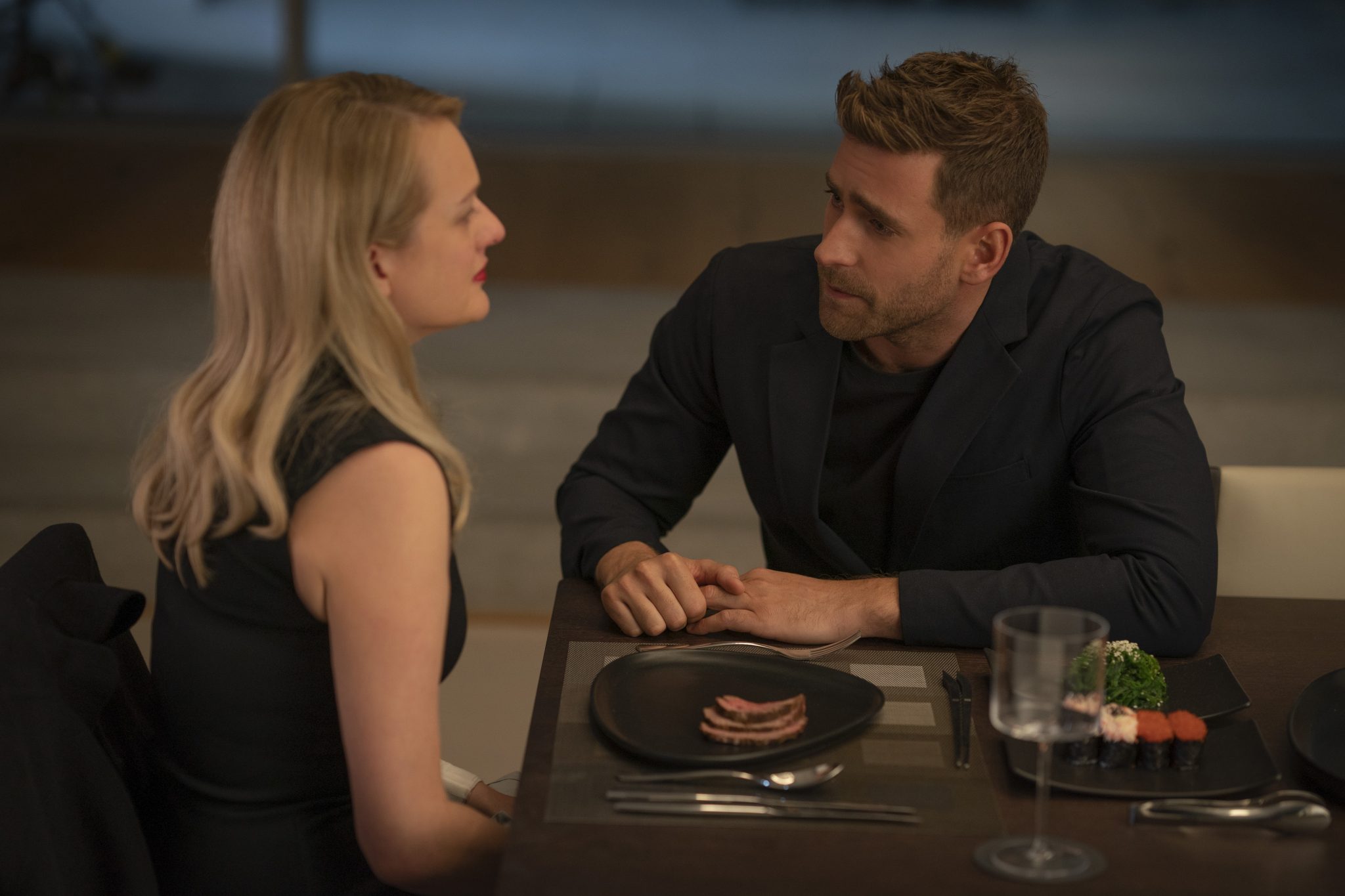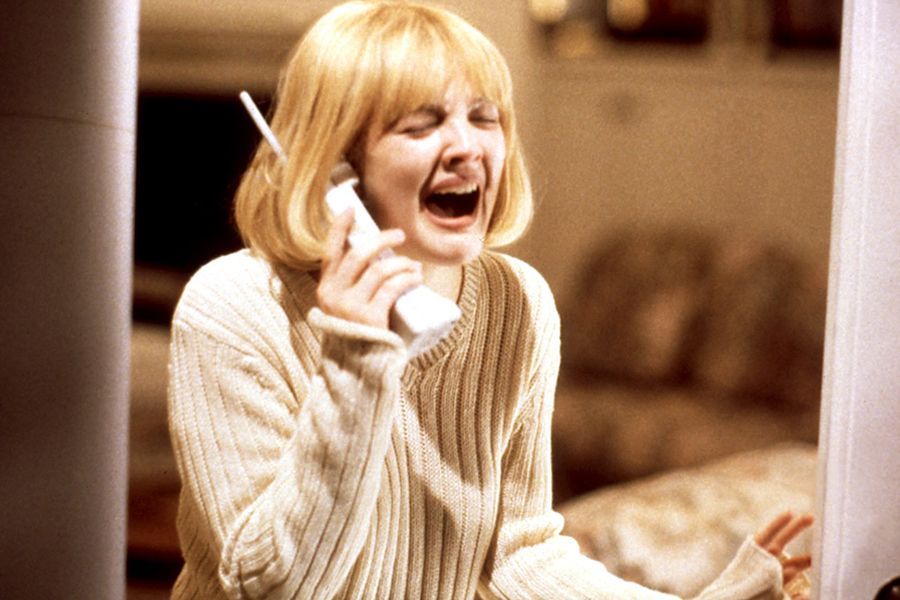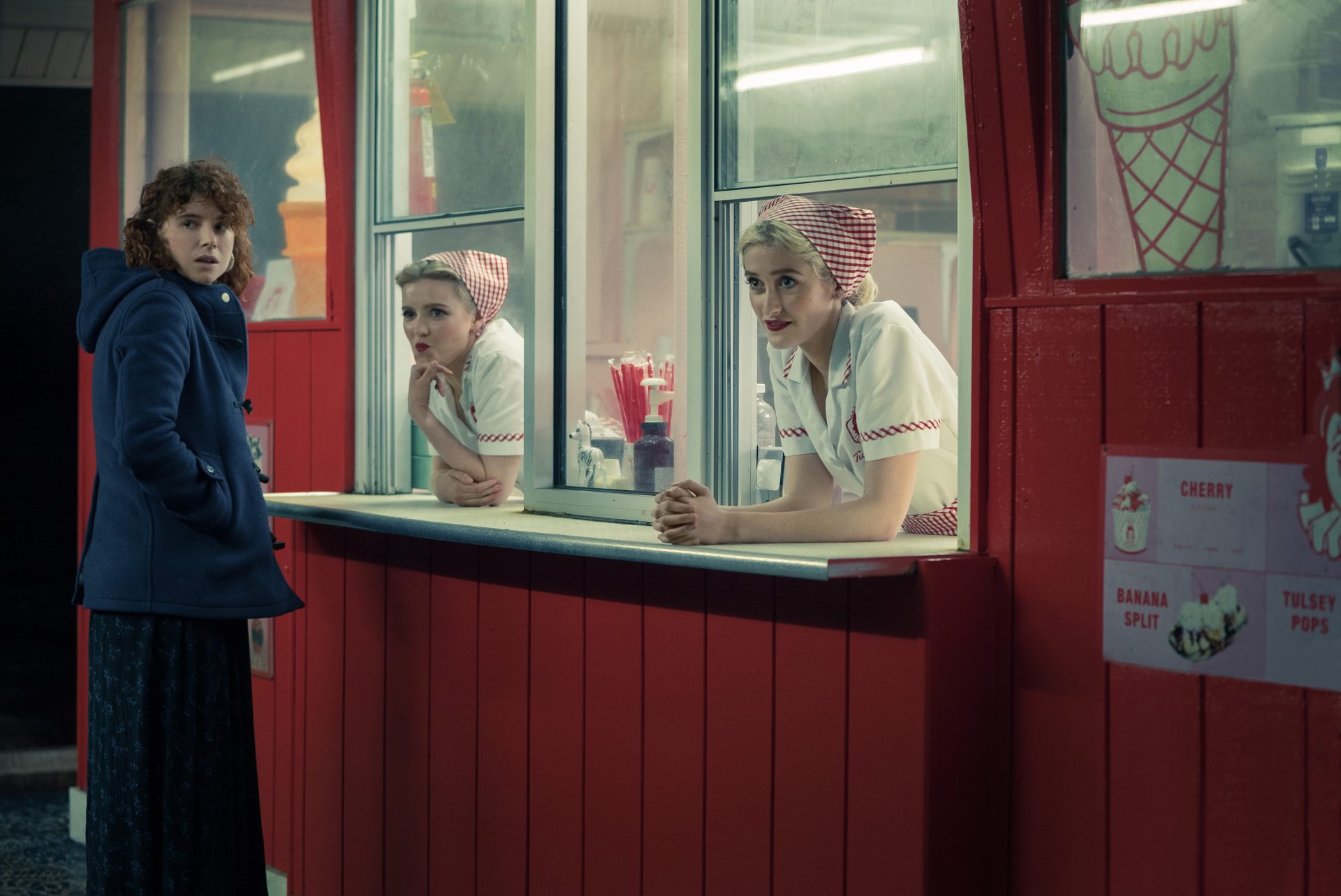From Midsommar to I’m Thinking Of Ending Things, these feminist horror films deal with everything from gaslighting to pregnancy – no holds barred.
Swallow
While this movie may not immediately strike you as a typical horror movie, the slow-burning suspense will surely have you on the edge of your seat. Or likely, recoiled back in horror. The 2019 film follows a young housewife with a seemingly perfect life who develops a disorder that gives her the irresistible urge to eat inedible objects.
Newly pregnant and consuming increasingly more dangerous objects, Haley Bennett (who has starred in The Girl On The Train and The Magnificent Seven) shines in the starring role as Hunter.
Censor
Censor – now showing in UK cinemas – takes us back to the “video nasties” scare of the early 80s. There, we join film censor Enid (Niamh Algar), who has developed something of a macabre fascination with schlocky horrors as she spends her days watching, cutting and classifying scenes of violence.
When she discovers an eerie horror that speaks directly to her sister’s mysterious disappearance, though, she resolves to unravel the puzzle behind the film and its enigmatic director – and it’s not long before her quest begins to blur the lines between fiction and reality in terrifying ways.
Without giving too much away, Censor is a thoroughly scary indie horror – but it also has a lot to say on art, media consumption, politics, and society. And, on top of all that, it also finds time to pass comment on the objectification of women via its lecherous producer, Doug Smart (Michael Smiley).
Give it a go. You won’t regret it.
Saint Maud
This critically-acclaimed horror follows Maud (Morfydd Clark), a reclusive hospice nurse charged with looking after Amanda (Jennifer Ehle), a retired dancer ravaged by cancer. As the film’s events unfold, though, Maud’s fervent faith quickly inspires an obsessive conviction that she must save her ward’s soul from eternal damnation… whatever the cost.
The majority of slasher films follow an age-old set of heteronormative rules – the girls who casually indulge in drugs, alcohol and sex are the first to be killed off, while “the final girl” (aka the survivor) is sweet and virginal. Saint Maud, however, pushes against these expectations brilliantly, offering up a very different kind of “body horror”.
In the process, it forces us to consider whether or not Maud – or any other woman, for that matter – can ever hope to achieve greatness in a patriarchal society that judges her worth by her sexuality. And, similarly, whether bodily autonomy will ever truly be achieved by womankind.
Fair warning, though; expect a lot of self-flagellation and mortification of the flesh as it works its way towards an answer, OK?
You may also like
Autumn TV: 23 gripping shows to watch now it's getting dark early
Midsommar
Midsommar doesn’t rely on darkness and shadow to send shivers down our spines – quite the opposite, in fact. But that’s because this isn’t your typical horror film; rather, it’s an all too relatable tale about gaslighting and unhealthy relationships.
Right from the beginning, it’s made clear that Christian (Jack Reynor) is thinking about dumping his girlfriend, that he’s going through the motions of being a good boyfriend until he’s paid his dues, and that he’s simultaneously been pushing Dani (Florence Pugh) away in the hope that she will do the hard bit for him: he wants her to initiate the break-up.
We know, likewise, that Dani isn’t innocent: her co-dependency has rendered her blind to Christian’s behaviour, and she views her relationship as beautiful even though it’s inherently toxic. She does her best to make things work. She does this even though she’s second-guessing herself all the time, feels confused, and finds herself always apologising to (and for) her boyfriend. And she does this even though that aching, aching, aching hole in her heart keeps her awake at night.
It’s the sort of film that’s bound to touch a nerve with any woman who’s found herself in a similar situation. Believe us.
You may also like
The anti-romcom: 13 horror films about seriously toxic relationships
Eve’s Bayou
“Memory is the selection of images, some elusive, others printed indelibly on the brain. The summer I killed my father, I was 10 years old.”
Thus begins Eve’s Bayou, a haunting horror about memories and traumas, both personal and communal.
Set over the course of a long, hot Louisiana summer, the film’s story is hinged upon the moment that 10-year-old Eve Batiste (Jurnee Smollett) stumbles across her father, suave doctor Louis (Samuel L. Jackson), conducting an affair.
Disturbed by what she’s seen, and even more disturbed by her father’s attempts to undermine what she’s witnessed, Eve seeks solace with her aunt, Mozelle (Debbi Morgan), who has the unwavering ability to see everyone’s future but her own. But, when her teenage sister, Cisely (Meagan Good), reveals that Louis has done something unspeakable to her, it becomes clear that there’s more to her father’s deceit than even Eve first thought.
Much like Doubt and Atonement, Eve’s Bayou challenges us to reconcile our own definitions of truth. Because, as this film makes all too clear, one devastating moment can be regarded and interpreted entirely differently through two viewpoints.
The Invisible Man
In The Invisible Man, Elisabeth Moss expertly creates a sense of fear and paranoia so palpable that it swiftly becomes our own. Because, just as she does in The Handmaid’s Tale, the actor is able to convey years of pent-up terror and anguish with just a twitch of her lips, or a shift of her eyes. This is a film, after all, about a woman desperate to escape a cycle of coercive control, and everything she does makes us fully aware of the fact that Cecelia is a victim of abuse.
As such, the film’s tense eight-minute opening hammers home the fact that she has to get out before it’s too late. That her life is on the line. That, if Adrian catches her, he will punish her in ways far too horrible for viewers to imagine.
What Cecelia fails to realise, though, is that Adrian will never let her go. And thus the unseen monster of this uniquely feminist horror is born.
Gothika
When Miranda (Halle Berry), a renowned psychiatrist, awakens as a patient in a mental institution, she quickly realises that she has absolutely no memory of the murder she’s accused of committing.
It quickly becomes apparent –to her, at least – that she has been possessed by a vengeful spirit, and one which has no qualms whatsoever about manipulating her into doing its bidding. To everyone else, though, Miranda is just another crazy woman who’s killed her husband. Which means that, no matter what she says or does, she will be treated as such by the people around her.
It’s a silly supernatural horror, true, but it’s one that taps into a fear that many of us share. Indeed, as Jenna Sauers of Jezebel says: “Reflexively calling women ‘crazy’ is a habit young men need to learn to break. As a term, ‘crazy’ is entirely of a piece with the long and nasty tradition of pathologising female emotion (and particularly sexuality).”
You may also like
Scream 5 trailer: Scream has been killing off sexist horror tropes for 25 years
Essentially, then, this is another film about gaslighting. So try rewatching it with this thought in mind, and see how you feel about it then.
The Witch
“I didn’t set out to make a feminist empowerment narrative. But I learned that writing a witch story is kind of one and the same.”
So says writer/director Robert Eggers of his “New England fairytale,” which takes us back in time to 1630. There, our coming-of-age hero, Thomasin (Anya Taylor-Joy), is struggling to comprehend the puritanical gender roles being forced upon her by not just society, but her family. And, too, she is forced to reckon with the aforementioned vilification of those young women who do break rank.
As such, The Witch tells a story of female anxiety and dread. It shows us what happens when a woman is left choiceless, seemingly with no viable option other than to become a wife and mother. And it reminds us, too, that the path to self-determination is never a smooth one for those who refuse to conform to sexist stereotypes.
False Positive
Ilana Glazer’s False Positive isn’t out yet, but that doesn’t mean we’re not excited about it. In it, she plays Lucy, a woman struggling to conceive – until, that is, her husband Adrian (Justin Theroux) takes her to see fertility expert Dr Hindle (Pierce Brosnan).
Within a few sessions, Lucy finds herself pregnant. And, while she’s overjoyed, she still can’t shake the lingering feeling that something is deeply wrong.
Speaking to the New York Times about the film’s handling of childbirth, a process which she feels has become debased and commodified, Glazer says: “I’m really obsessed with how in-plain-sight evil the system that we live in is.
“It’s absurd and it’s funny, even though it’s horrible, the way we are stripped of our humanity. Everyone is gaslit into thinking it is normal.”
You may also like
Horror films based on true crime cases: 10 terrifying films based on real life events
Consider this film, then, Rosemary’s Baby for the modern age.
Scream
Oh yes, we’re 100% talking about the seminal 90s slasher. Because, while it’s all too easy to dismiss Scream as just another scary movie, it’s important to look past Ghostface’s reign of terror and take a closer glance at the film’s feminist hero.
For much of the first film, Sidney (Neve Campbell) isn’t just dealing with a psychotic serial killer; she’s also struggling to make her abusive boyfriend understand that she’s not ready to have sex with him. It’s an incredibly reasonable request, but one he does not take lightly; indeed, he bullies her into believing that she is a terrible girlfriend for refusing to give him what he feels he’s owed.
Sidney, due to an overwhelming slew of evidence against Billy (Skeet Ulrich), begins to believe he is the killer behind the mask – something which he doesn’t just deny, but insists she’s crazy for even entertaining. And so, when (spoiler) he’s a) successful in shaming her into having sex with him, and b) unveiled as Ghostface at the end of the first film, it’s even more disturbing a revelation; he’s been gaslighting Sidney all this time.
Thankfully, though, Sidney makes a point of working to move past the abuse she’s been subjected to. Of not just surviving, but thriving. Too bad, then, that she’s trapped in a seemingly neverending horror franchise, eh?
Jennifer’s Body
On paper, this cult comedy-horror sounds pretty silly; Jennifer (Megan Fox) turns into a succubus, using her sexuality to lure men to their untimely ends. And, when her best friend Anita (Amanda Seyfried) learns the truth, it’s up to her to stop her pal… before it’s too late.
Watching the film in a post-MeToo world, though, there are bigger questions to wrangle with. Namely, what really happened to Jennifer after she was bundled into “one of those white molester vans with no windows” and driven off against her will.
The answer, of course, is that she’s been used and abused by a group of men, who decided to make her the virgin sacrifice in their Satanic ritual. Because she’s not a virgin, though, everything goes wrong – resulting in the aforementioned succubus situation.
As Vox puts it: “It’s the story of a group of powerful men sacrificing a girl’s body on the altar of their own professional advancement – and it’s also the story of them using her torment as a bonding activity.”
Us
When Adelaide (Lupita Nyong’o) takes her family to the beach for a much-needed vacation, she isn’t expecting them to be attacked by their own murderous doppelgängers, clad in blood-red jumpsuits and armed with frighteningly shiny scissors.
Thankfully for her husband and children, though, the matriarch is more than willing to step up and fight for them. Hard. And this, when you consider how Black women have been portrayed by the genre until now, feels like “an act of defiance.”
As Stylist reviewer Danielle Dash puts it: “The history of horror on the silver screen is a damning indictment of the treatment of Black women at the hands of the genre’s leading voices. Us reminds Black people, and Black girls and Black women specifically, that while our race is important, it’s not all we are.”
Of course, it’s a tricky one to pin down thematically; Us deals with Adelaide’s experiences of womanhood, of motherhood, and of imposter syndrome, among many others. However, the film’s creator, Jordan Peele, has told The Root he hopes that his movie’s message about self-reflection shines through brightest.
“[When] I decided to write this movie, I was stricken with the fact that we are in a time where we fear the other, whether it is the mysterious invader that we think is going to come and kill us or take our jobs or the faction that we don’t live near that voted a different way than us,” he said.
“We’re all we’re all pointing the finger and I want to suggest that [when] making a monster, we really need to look at our face. Maybe the evil is us.”
Carrie
On the day of her prom night, 17-year-old Carrie (Sissy Spacek) discovers that she possesses telekinetic powers. And we all know what happens next, don’t we?
As ever, though, there’s more to the Stephen King adaptation than that.
Speaking honestly about his inspiration for the story, King says: “Carrie is largely about how women find their own channels of power, but also what men fear about women and women’s sexuality.
“Writing the book in 1973 and only three years out of college, I was fully aware of what Women’s Liberation implied for me and others of my sex. Carrie is a woman feeling her powers for the first time and, like Samson, pulling down the temple on everyone in sight at the end of the book.”
Considering the film also deals with the trauma of puberty, adolescence, and sexual awakenings, then, there’s a lot to unpack in this 1976 classic.
Slither
Every bit as witty as it is repulsive, Slither is ostensibly about alien parasites. If you look beyond the invasive slug-like species, though, you’ll find it’s also about the complex layers of abusive and toxic relationships.
Grant (Mark Rooker), you see, is a possessive asshole. The kind of possessive asshole who refuses to let his wife, Starla (Elizabeth Banks), spend time with her male colleagues. Who cheats. Who lies. Who thinks sex is a wife’s marital duty. And who heads out drinking all night long if said marital duty goes unfulfilled.
Grant, of course, gets his much-deserved comeuppance as the film progresses, and the truth of his ugly nature becomes clear to the entire town. Starla, meanwhile, completely reclaims herself and transforms into the sort of badass horror heroine who refuses to let anyone – especially her deadbeat slug of a husband – hold her back.
The Babadook
Another horror film about the horrors of motherhood, The Babadook centres on Amelia (Essie Davis), whose young son, Samuel, has violent tendencies and frequent temper tantrums.
Struggling to deal with his difficult behaviour, Amelia is constantly left exhausted and embarrassed. Nothing she does is deemed good enough. She struggles to sleep, to empathise with those around her, to deal with her own traumas. And, most of all, she deems herself a monster because of her failure to connect with her son.
Speaking to The Guardian about her film, director Jennifer Kent says: “We’re all, as women, educated and conditioned to think that motherhood is an easy thing that just happens. But it’s not always the case. I wanted to show a real woman who was drowning in that environment.
“I thought that maybe I would be criticised by women, by mothers, because I’m not a mother. The opposite has happened; I’ve experienced a collective sigh of relief that women are seeing a mother up there that’s human. Sure, it’s an extreme situation but what I realise is that a lot of women have felt those feelings that Amelia goes through at some point along the way.”
I’m Thinking Of Ending Things
I’m Thinking Of Ending Things is a strange sort of horror film, examining the identities we project onto our romantic partners. But trust us when we say that it is so much more than just a tale about a relationship past its sell-by date; it’s about the enormous pressure that women are put under when it comes to ensuring the people around them feel comfortable and happy – even if this comes at their own expense.
As Stylist reviewer Almara Abgarian puts it: “It’s female nature to say yes (or stay quiet) when we want to say no, whether it’s ignoring our gut and continuing a relationship that we know isn’t good for us or pandering to a man’s emotions for fear of hurting his ego.
“It has been drilled into us since we were young; ‘good girls do as they are told’ and all that… [but] we need to demand more for ourselves.”
Essentially, we need to stop thinking about ending things and just… end things, lest we wind up in the same terrifying situation as Jessie Buckley’s character.
Images: Csaba Aknay/A24/Universal/Scream/Dimension Films/Netflix
Source: Read Full Article



